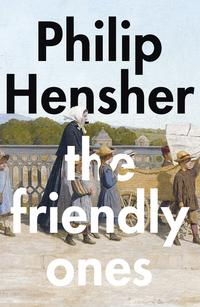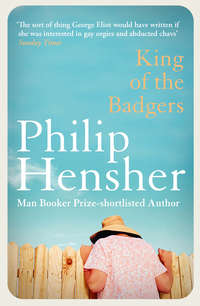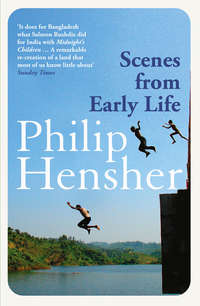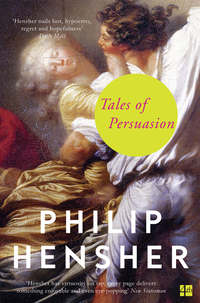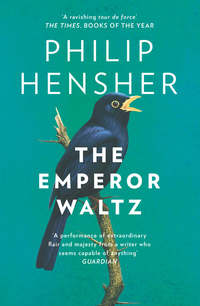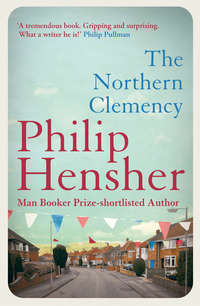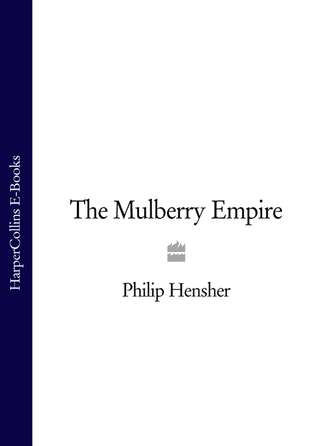
Полная версия
The Mulberry Empire
‘My daughter, Lady Woodcourt,’ Colonel Garraway says, with all his opium-glazed gravity. Lady Woodcourt nods, so calmly that Bella unkindly wonders whether she, too, has been drinking from the phial of the ruby witch. She has learnt how to be suspicious of anything as innocent as composure or boredom in anyone much over the age of forty-five. They all do it, she suspects; and none of them discusses it in her hearing, ever.
‘I’m afraid you will find us all,’ Lady Woodcourt says, ‘a very dull old company tonight. Do sit down. I am quite mortified, my dear, to inflict such a, such a bundle of dry old sticks on you. I positively fear you may never come again, and that, that, that—’
‘That would never do,’ Colonel Garraway supplies gallantly, handing his daughter to a settle, and sitting down after her. Lady Woodcourt laughs brilliantly, a sound as if her glassy old bones have tumbled loose, all at once, and chimed together into a heap, somewhere inside her skin.
‘I’m sure it will be delightful,’ Bella says, inadequately.
‘Such a lot of dry old sticks,’ Lady Woodcourt says, with a touch of steel, not liking to be contradicted even in this mock-apology. She seems to believe her own polite disclaimer for a second, believing what she says as she says it, as all liars must, and a cloud passes over her brow. ‘Still – that wonderful young man – the explorer, who, who, who—’
‘The hero of Bokhara,’ Colonel Garraway adds, smiling. ‘Yes, that very wonderful young man.’
‘Bokhara,’ Lady Woodcourt sighs, relieved. ‘Now that is a place, I swear, not one person in a thousand had heard a jot or, or, or tittle of one year ago. And now we talk of it as readily as we talk of, of—’
‘Dorsetshire,’ Colonel Garraway says.
‘Of Dorsetshire,’ Lady Woodcourt continues. ‘My young friends talk of nothing else. I think one or two, they fancy taking a house in the better quarter of Bokhara for the winter. Now what do you think of that?’
‘I’m sure I don’t know,’ Bella says, faintly alarmed as Lady Woodcourt spectacularly tinkles away.
‘All stuff and nonsense, of course, and I don’t believe any one of them could point to the wretched place on the map. Still, we talk of nothing else, I find, and all down to this singular, ah, fascinating, ah, ah, remarkable young man, all—’
‘Captain Burnes,’ Bella interjects.
‘Indeed. Thank you, my dear,’ Lady Woodcourt says, looking genuinely as if no one has ever done her a greater favour. ‘And now, who is this—’
‘M. le Duc de Neaud,’ the footman calls, or rather attempts, since what he announces is the Duck de Nod. ‘And,’ as a little woman in a snuff-coloured dress scurries in after her diminutive husband, ‘Mme la Duchesse.’
Everyone rises with an audible relief.
‘Delighted – charmed – delighted – quite on time – feared to be early – my dear Fanny – my dear—’ the Duchesse de Neaud spills over. She is English, a chatterbox, resented by no one, welcome everywhere, if she does not come first or leave last. The Duc limits himself to a quick bow and a scowl. He came over after the Revolution and, penniless, married one of those spinsters who attended the old Queen Charlotte, to everyone’s surprise, including hers; her future had seemed to be mapped out in the series of faintly dictatorial books for children she wrote in dull afternoons at Windsor. She turns from Lady Woodcourt to Bella. ‘My dear – my dear—’
Colonel Garraway snaps into awareness. ‘Duchesse,’ he says. ‘My daughter, Bella.’
‘Miss Garraway,’ the Duc says. ‘Charmé.’ But he is already turning, already charmed, it seems, with the next entrants, and Bella sees no reason not to sink back into her chair as the room starts to fill.
5.
‘Charmed – delighted – couldn’t be more—’ the Duchesse says, sitting down by Bella. But she is talking, not to Bella but to a fast-approaching young man, pink in his half-worried, half-confident face. He bows rapidly, crumpling at the middle like a man who has been punched hard.
‘May I inquire,’ the young man says to the Duchesse. Bella stops paying any attention, and concentrates on her fan. The old people are coming in, showing no emotion, walking smoothly around each other, bowing automatically, like puppets on casters. The boy at the door is keeping up, but there is now quite a queue outside, waiting to hand their card and have him call their name. She is called back by her name.
‘I quite doted on Bella when she was too little to know who was kissing her goodnight,’ the Duchesse glitters, aiming her smile somewhere beyond the young man, bowing and smiling nervously. ‘Quite doted on her. I would hug her and affection her, and – such a pretty little thing, and now, quite such a beauty, now, don’t blush, my dear.’
Bella bows, remembering very well what it was like to be clutched to the swarthy old Duchesse’s bosom, heavy and spiked with trinkets; it felt like falling through the window of a jeweller’s shop. The Duchesse bows back, and then the young man bows, and they are all precisely like an entire yard full of tired chickens. She was no Duchesse then, but only an old spinster. The young man presents a familiar face to Bella.
‘How do you do, Miss Garraway,’ the familiar face says.
‘How do you do,’ Bella says firmly back, smiling like the audience at a vaudeville.
‘Miss Gilbert,’ the yelping barker cries into the room, ‘and Miss Jane Gilbert.’
She sees from the smiling guest’s proprietorial security, his relaxed saunter back into the chair, that this is the son of the house. She corrects herself, looking at Lady Woodcourt, who has no sons. She is no more fecund than a sideboard. This, surely, is the guest of honour. ‘How do you do, Mr Burnes. Do you find the climate here suits you? Or do you long for the East?’
‘Have you read Mr Burnes’s book, Miss Garraway?’ the Duchesse interposes. ‘I rave over it – the learning – the wit – the fierce fierce tribes of the exotic East. How brave – how heroic you have been, sir. Have you read his book?’
‘I have tried, sir, so many times, and each time the bookseller sends me back empty promises, leaving me abandoned. I am not entirely hopeless, but your bookseller is quite the jilt, Mr Burnes.’
The Duchesse laughs brilliantly, flutingly; a youthful and yet historic noise, a descending scale directly from old Queen Charlotte’s nurseries. If the Duchesse laughs, there can be no impropriety whatever in this corner of the blue and gold drawing room. Two sisters approach, their faces long as doors: the Gilbert sisters. In mourning, as they so often are, they scrutinize Burnes efficiently. The elder is twenty-seven, and five years ago was sadly disappointed in love; the younger is no older than Bella, but already has her sister’s half-angry air, and will come to nothing in the end.
‘Quite the jilt,’ Bella says, as the sisters move on.
‘You must tell us,’ the Duchesse continues, ‘of your adventures in Bokhara. I long – I pine – for the story, the entire tale, from the horse’s mouth.’
‘So long and dull a story can hardly interest ladies,’ Burnes says conventionally.
‘No, no, Mr Burnes,’ the Duchesse says, but she seems to take him at his word, since she rises and goes, smiling, into the crush. The room is crowded now, and Bella’s father, there, fifteen yards away, is fixed in his gaze and uncomprehending. One of the Gilbert sisters is talking at him, and directing a fierce laugh at him, the laugh of someone who knows rejection well; he looks like a frightened old man. This is how it is, an hour after his dose. She does not know, and does not wish to know, where he buys what he needs; she only knows, with a wave of shame, that he no longer even talks about it. She wants to rescue her father, there, standing in the embrace of his invisible ruby witch. Burnes, next to her, is twitching like a bird on the branch. It is her duty to carry on talking to him about his East, but she looks at her father and has nothing to say to such a stranger.
6.
Through these evenings, these festive London gatherings, people move without any will, like balls on a billiard table. At one end of the space, new balls spill into the confined space, and at the far end, the balls drifting around the smooth space prod each other and drift off unpredictably. An announcement at the door, a pair of new arrivals, somehow nudges the room along a little, and the mass, unwilled, cannons through the room, and the last ripple brings Burnes to his feet, and face to face with Stokes, a brilliant and brilliantly polished writer for the journals, his head smooth and gleaming like marble, his glittering spectacles always ready to be whisked off to make a point. They greet each other, silently.
‘I understand, Mr Burnes, that you have been signally honoured,’ Stokes begins.
‘Beyond my desserts, no doubt, sir,’ Burnes says.
‘I heard that you were signally honoured,’ Stokes persists. ‘By our friend in Brighton.’
‘I would hardly call the King my friend,’ Burnes says. Or yours, he seems to insist.
‘That must have been a thrilling occasion, sir,’ Stokes said.
‘If I were, indeed, honoured by the King’s curiosity in my explorations,’ Burnes says, ‘you could hardly expect me to tell you the purport of the conversation.’
‘Come, come, Burnes,’ Stokes says. ‘I meant no affront. I did not think it was so very secret. It was from the – no, better not to say – but it was from a gentleman of the Court that I heard the interesting fact. Would you prefer to find some more quiet place to talk?’
‘No, sir,’ Burnes said. ‘I can have nothing to say to you that I would keep from any person here present. I was honoured by the King’s interest, who had read my book with the greatest curiosity, and I received the King’s gracious command to Brighton. That is all. A trivial meeting, made remarkable only by the King’s majesty. There is really nothing more to say.’
(He resists the recall of the jovial bulging maggot in silk stockings and a scrubby wig, thumping the floor with his stick, his nervous Queen clutching the gilt sides of the chair, underneath the vast grand mouldings and velvet and gilt, what passed in his late brother’s mind for an oriental palace, and asking such blunt ordinary wrong questions it was not in him to know how to respond, to offer any kind of satisfaction.)
‘Your reticence does you credit, sir,’ Stokes says. ‘I have read your book, and greatly admire it. You exhibit the greatest faculties of curiosity, erudition and exposition. But I reached the end of your book with one burning question, ah, as it were, unextinguished. What in heaven’s name are we doing in Afghanistan? What, come to that, are we doing in India?’
‘Sir, I hardly know what you can mean.’
‘My meaning is this,’ Stokes continues. ‘What drove us to acquire our oriental possessions? And what is driving us to acquire still more? I presume, sir, that you were not in Kabul in pure curiosity. I presume, in short, that your mission was conducted to the sound of those siren voices enjoining us to occupy the whole of Asia, and bankrupt our children and our children’s children and our children’s children’s children. There can be no doubt that you were there to prepare for us to acquire the Punjab, to repeople Afghanistan with our sons and daughters, and open up yet another bottomless pit, to swallow our limited resources – resources which could be put to better use two miles from this house, to clothe and feed the filthy urchins who will beg a farthing from you, and from me, the second we leave our so agreeable hostess’s embrace this evening. What, sir, in heaven’s name, are we doing in India?’
‘You are quite wrong, Mr Stokes,’ Burnes says. This is a familiar argument; he has had it, indeed, with Stokes on previous occasions. ‘There is no intention to add the Punjab or the western tracts of land to our possessions. My mission was purely geographical, purely driven by curiosity. But what, sir, would be the alternative you propose? Were we to stay at home and do nothing?’
‘And why not? What is so wrong with being satisfied with what you have?’
‘Nothing, sir, unless you have the spirit of a Briton. Our possessions, sir, are vast new markets. Do you suppose our little island can contain our native spirit? Of course it cannot. And should we stay at home, relinquish India tomorrow, what would happen? Would the natives not slide back into all manner of native barbarities – the murder of travellers, the forced suicide of widows? Thuggee and suttee? Would the precious flame of Christianity survive six months in such a poisoned atmosphere? Would India, indeed, be left to its own devices? Would not the French perceive an empty space? Would not Russia send its vast armies to bring new barbarities to a barbarous land? Sir, I suspect you of the worst sort of cynicism.’
‘Perhaps,’ Stokes says, smiling, maddeningly, like a teacher praising a moderately bright pupil. ‘I admire your spirit, Mr Burnes – I who have never travelled so far as to see the ocean.’
Burnes bows, deeply, coldly; he is oddly irritated by the conversation.
7.
One of the chessmen comes smoothly into the room, and stops just short of Lady Woodcourt. She breaks off her animated conversation with the latest of the guests, and turns to the footman. The guest bows to her back, and makes his escape into the room. What information the footman bears must be thrilling, for in an instant Lady Woodcourt clasps her hands to her brown wrinkled bosom, as if to stop a pet white mouse escaping from between her dugs, and skips girlishly into the centre of the room. The chatter in the room stops raggedly, and the guests all turn to her, shining with her announcement. She calls out, not raising her voice, and everyone graciously inclines in her direction, like a grove of willows in the breeze.
‘… in honour of our most favoured guest, the hero, I may say, may I not, of Bokhara, M. Mirabolant has graciously consented …’
Burnes, who has sat down again, is nodding and smiling; he has had plenty of time to grow used to this announcement.
‘… M. Mirabolant has created a new, a marvellous dish, in honour of his adventures, his great heroism – dear friends, one moment, only …’
And the doors are swung open, and, there is M. Mirabolant, the great chef de cuisine on whom all London dotes – what all great London used to call a Cook. The great M. Mirabolant, universally agreed to be the greatest Frenchman in existence since – since – since Napoleon, since Voltaire, since time began. And before him is borne a large white china dish, piled high with some white stuff into the approximate semblance of a snowy mountain. M. Mirabolant is all geniality, his broad red face greeting the room without, precisely, greeting anyone. There is a little murmur and patter of applause, as the ladies’ hands, soft as the flapping of doves into the sky, acclaim the dish, and the room turns from Mirabolant to the plump hero of the hour, who smilingly discounts any sense that he is worthy of Mirabolant’s marvellous pudding.
‘M. Mirabolant,’ Lady Woodcourt insists, ‘tell me, do not all dishes have a name?’
M. Mirabolant, all geniality, agrees that they do.
‘Pray, M. Mirabolant,’ the Duchesse de Neaud joins in, ‘charming, quite charming – do tell us, what are we to call this dish?’
M. Mirabolant draws himself up, pulls on the left outer extremity of his marvellous black moustache, gazes in deep thought at the glossy mountain of cream on the shoulders of two trembling footmen. Perhaps no inspiration will come, and the room trembles before M. Mirabolant’s genius. But they need not worry; for a light falls on the great Frenchman’s face, and genius prepares to speak.
‘It calls itself,’ he growls, his eyes fixed, as if in a trance, on the dish, and not at all on the attending multitudes, ‘une coupe Bokhara.’
And now a rapture of applause breaks out in the room, and Mirabolant turns and sweeps out, leaving his adoring public, his ecstatic mistress, quite as if he had hired them for the evening, and not the other way round. Leaves, too, a confection made up entirely of iced cream and crushed meringue, the whole sprinkled with white rose petals.
‘Tell me, Mr Burnes,’ Bella finds herself saying. ‘Is this a customary dish of the natives of Bokhara?’
‘To the best of my recollection, Miss Garraway,’ Burnes responds gravely, ‘they dine on it nightly. Meringue is their staple diet.’
‘I was certain of it,’ Bella says. ‘You must have had more dishes named in your honour than anyone now living.’
Burnes laughs heartily, immediately smothering the noise. ‘Perhaps I am a little ungrateful,’ he says. ‘But it seems to me that, like the Dutchman’s daughter, the dish has been christened twenty times, and still remains no better than it was at the first.’
‘Is it always coupe Bokhara, Mr Burnes?’ Bella says. ‘I do hope not – what a melancholy prospect that would be. Not only to have to eat iced cream and meringue every night, but not even to have the solace of variety offered by an occasional change of name.’
A cousin of Lady Woodcourt has gone to the piano, and has started up a strange crooning and crackle, which passes for a selection of Welsh airs; a young man stands by to turn the pages, his eyes wandering about the room, his fervour all directed towards finding some means of escape from his sentry duty.
‘No, not always, indeed, Miss Garraway,’ Burnes says. ‘I think it is only coupe Bokhara when M. Mirabolant takes the helm.’
‘Twice weekly?’ Bella says.
‘Quite that,’ Burnes agrees. ‘Other than that, it may be anything at all; blanquette à l’ Afghanienne, rôti de porc à la mode de Kabul, or coupe Bokhara. Yes, perhaps you are right; it is mostly coupe Bokhara.’
‘And is it always iced cream and meringue with white rose petals on top?’
‘Always. No – I do Mirabolant an injustice – perhaps once the rose petals were pink.’
The macabre daughters in their matching grave-gowns, taking a turn about the room, now come to where Burnes sits with Bella. They bow, sourly; Burnes responds, Bella makes a tiny incline, her shoulders trembling with withheld laughter, and they pass on.
‘I think your brother was in India, Miss Garraway,’ Burnes says when they are gone.
‘Yes, Harry,’ Bella says quickly. ‘Yes, that is right. How did you come to know such a thing?’
‘I think it was the first thing I knew about you,’ Burnes says. Bella blushes and lowers her head, pretending to smooth her gown. ‘I heard of him in Calcutta. It was a sad end. He was spoken of well by everyone.’
‘Thank you, sir,’ Bella says. ‘My father would be comforted to hear you say that. We hoped India would be the making of him.’
‘I am sure it would have been,’ Burnes says. ‘I would not wish to intrude on your father in such festive – I mean – I would not be the one to bring melancholy thoughts to mind among happy friends.’
Bella smiles, seeing where all this talk is leading. All this chatter about poor useless Harry, sent out to India to save his name and put an end to his card debts, dead in three months in an unmentionable duel over an officer’s wife or, in official despatches, of the terrible Calcutta cholera. Poor Harry, indeed; but now, at least, he seemed to be serving some kind of useful purpose.
‘I wonder if you would permit me to call,’ Burnes says. ‘To offer some small solace to your poor father.’
‘I am sure he would take great pleasure in your conversation, Mr Burnes,’ Bella says, smiling warmly. ‘You are welcome to call at any time.’ And rests, for one moment, her little white hand on Burnes’s; it is cool and pale, his hand, and as she touches him, he does not start, or move, but merely stares, gazes, at the two-second miracle of her hand in his.
‘Thank you,’ Burnes says, helplessly. ‘And I shall bring my book, if you would permit me.’
‘We should be delighted,’ Bella smiles, and her smile is big and white and open. Her little square teeth, her clean pink mouth, her perfect lips. The smile, it makes him pause, and look, and around him, the room is silent, as if a great glass bell has dropped over them, and they move in a slower, bigger atmosphere. She smiles, and she shows her teeth, and glitters at him; there is no modesty in her, but only delight. He thanked her, and she is, for no reason, delighted.
At the other side of the room, Colonel Garraway snaps back into consciousness, his back upright and clean. It is like a window opening in the room. There before him is a girl, sour in the face and wrapped in black, looking at him inquiringly. He has no idea who she is, or what she has just said. At the other end of the room, there is a girl sitting on a sofa with a man. She is his daughter, his daughter Bella. He stands upright, and sees exactly where he is, at Lady Woodcourt’s. He bows, for no reason, at the girl in black, by his side, and then sees that behind him is a window, and outside the window is the street, and in the street ten or twenty boys, urchins, are leaping up and down, trying to see into the house, to look in and see Colonel Garraway looking out, just as he is looking out trying to see them looking in. A brilliant thought occurs to him now; the world is full of windows, and some are inside the head, and some are not. He must go home and write that down. He bows again to the girl by his side, whose name is Miss Gilbert. He will go and fetch his girl, Bella, who is looking damned fine, and then they will go home, and he will write down his brilliant thought, whatever it was.
Burnes stays for half an hour after the departure of Bella and her father. He is the guest of honour, but he is allowed to be tired. And tomorrow, he has something to do. He leaves the fluttering gracious crowd, feeling no gratitude to be treated in this luxuriant way, but only relief to be free and once again in the street, in the open air. And tomorrow, he has something to do. He walks out of the door, and there is his carriage, waiting for him. But he does not step into it. He stands on the steps, and, if his feet are in the mud, his eyes are on the night sky, and what he thinks about is something not there, but only in his thoughts. Her teeth, eyes, hands.
FOUR
1.
ALEXANDER BURNES DID NOT COME the day after Lady Woodcourt’s party – or the next day – or the day after that. And on the fourth day, just when Bella and her sister had gone to the Park – just, in fact, at the hour when they might have been expected to be in the Park – he left his card and a set of his Bokharan travels.
Bella made no gesture when she saw the bit of pasteboard, showed no feeling beyond an agitated fumbling with her bonnet’s ribbons. But, walking upstairs as upright as she could manage, as slowly as she could, she felt cheated of something, as if she had been promised the most thrilling-sounding of M. Mirabolant’s puddings, and, in the event, she had been presented not even with the customary confection of meringue and cream, but, four days after she had expected it, an engraving of the promised delight on a card three inches by two. Walking slowly up the stairs, she ran her fingers over the card, three inches by two, as if it held for her the slightest promise, as if it had anything in common with her uselessly unshared hopes. Bella was twenty-four. She expected nothing.
So it was that, when Burnes was announced, a full week after Lady Woodcourt’s famous party, and shown into the drawing room where Bella was sitting, alone with her work, she stared at him as if she had never seen a man in her life.
The Garraways lived in Hanover Square, in a house so exactly what one would have expected that, Bella thought, none of her family or her family’s friends could ever be said to have set eyes upon it. It had precisely the right amount of old furniture to be respectable; it had precisely the right number of new objects to be fashionable. There was a pianoforte and a harp; there were sofas and curtains and a wilderness of walnut, just as other people had; there were portraits by Lely of dear great-great-grandmama, stout in a blue silk gown with her hand resting on a silver globe and pointing to the heavens. There was an ugly one, too, of poor Harry which he had ordered the week after arriving in India, in which his head was inexplicably round as a football (‘A native artist,’ Colonel Garraway was apt to say in mitigation, showing the curious visitor the label, ‘Executed in the Year 1826 by the Humble Servant of the Brush T. S. Lal, Student and Pupil of the great English Master, Sir Tilly Kettle’). All quite as everyone else had things; all so perfectly appropriate to the Garraways’ station in life that one could have predicted the house’s exact appearance, and certainly had no need to look at it. It was true that the Garraways, in their dining room, had what, through the gloom, could be perceived to be a lamentable mythology by Hogarth where others might have had a doubtful Claude, but what of that? The Garraways were so completely respectable that they could pass off a small lapse like that as an interesting curiosity, and nobody doubted, since they said so, that an interesting curiosity is what it was. They were respectable to the point of dullness.


